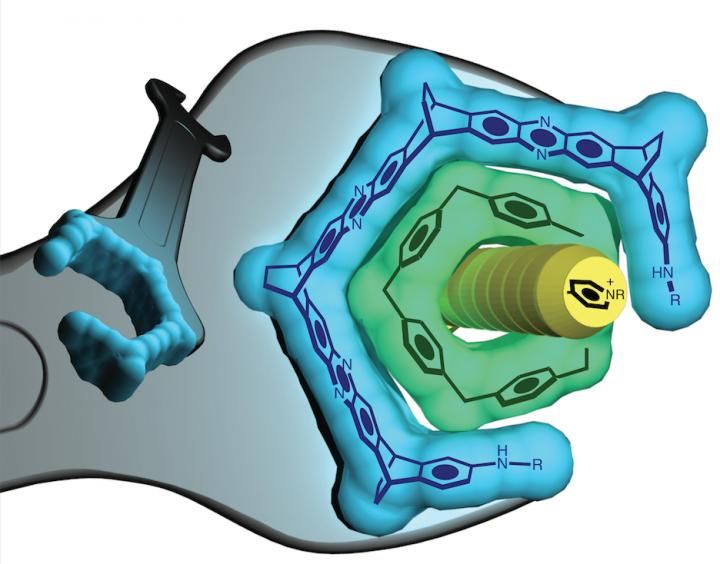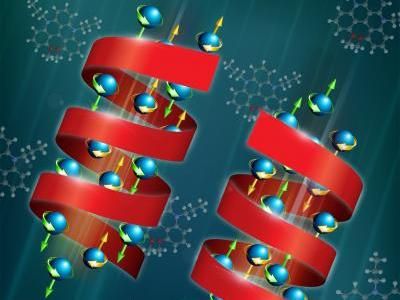Scientists build wrench 1.7 nanometers wide
University of Vermont chemist Severin Schneebeli has invented a new way to use chirality to make a wrench. A nanoscale wrench. His team's discovery allows them to precisely control nanoscale shapes and holds promise as a highly accurate and fast method of creating customized molecules.

A blue wrench (of molecules) to adjust a green bolt (a pillarene ring) that binds a yellow chemical "guest." It's a new tool - just 1.7 nanometers wide - that could help scientists catalyze and create a host of useful new materials.
Severin Schneebeli, UVM
This use of "chirality-assisted synthesis" is a fundamentally new approach to control the shape of large molecules--one of the foundational needs for making a new generation of complex synthetic materials, including polymers and medicines.
Like Legos
Experimenting with anthracene Schneebeli and his team assembled C-shaped strips of molecules that, because of their chirality, are able to join each other in only one direction. "They're like Legos," Schneebeli explains. These molecular strips form a rigid structure that's able to hold rings of other chemicals "in a manner similar to how a five-sided bolt head fits into a pentagonal wrench," the team writes.
The C-shaped strips can join to each other, with two bonds, in only one geometric orientation. So, unlike many chemical structures "this has only one shape," Schneebeli says. "It's like a real wrench," he says - with an opening of 1.7 nanometers.
"It completely keeps its shape," he explains, even in various solvents and at many different temperatures, "which makes it pre-organized to bind to other molecules in one specific way," he says.
This wrench, the new study shows, can reliably bind to a family of well-known large molecules called "pillarene macrocycles." These rings of pillarene have, themselves, often been used as the "host," in chemistry-speak, to surround and modify other "guest" chemicals in their middle--and they have many possible applications from controlled drug delivery to organic light-emitting substances.
"By embracing pillarenes," the Vermont team writes, "the C-shaped strips are able to regulate the interactions of pillarene hosts with conventional guests." In other words, the chemists can use their new wrench to remotely adjust the chemical environment inside the pillarene in the same way a mechanic can turn an exterior bolt to adjust the performance inside an engine.
The new wrench can make binding to the inside of the pillarene rings "about one hundred times stronger," than it would be without the wrench, Schneebeli says.
Making models
Also, "because this kind of molecule is rigid, we can model it in the computer and project how it looks before we synthesize it in the lab," says UVM theoretical chemist Jianing Li, Schneebeli's collaborator on the research and a co-author on the new study. Which is exactly what she did, creating detailed simulations of how the wrench would work, using computer processors in the Vermont Advanced Computing Core.
"This is a revolutionary idea," Li said, "We have 100% control of the shape, which gives great atomic economy--and lets us know what will happen before we start synthesizing in the lab."
In the lab, post-doctoral researcher and lead author Xiaoxi Liu, undergraduate Zackariah Weinert, and other team members were guided by the computer simulations to test the actual chemistry. Using a mass spectrometer and an NMR spectrometer in the UVM chemistry department, the team was able to confirm Schneebeli's idea.
Original publication
Most read news
Original publication
Dr. Xiaoxi Liu, Zackariah J. Weinert, Mona Sharafi, Dr. Chenyi Liao, Prof. Jianing Li and Prof. Severin T. Schneebeli; "Regulating Molecular Recognition with C-Shaped Strips Attained by Chirality-Assisted Synthesis"; Angew. Chem. Int. Ed.; 2015
Organizations
Other news from the department science

Get the chemical industry in your inbox
By submitting this form you agree that LUMITOS AG will send you the newsletter(s) selected above by email. Your data will not be passed on to third parties. Your data will be stored and processed in accordance with our data protection regulations. LUMITOS may contact you by email for the purpose of advertising or market and opinion surveys. You can revoke your consent at any time without giving reasons to LUMITOS AG, Ernst-Augustin-Str. 2, 12489 Berlin, Germany or by e-mail at revoke@lumitos.com with effect for the future. In addition, each email contains a link to unsubscribe from the corresponding newsletter.





























































